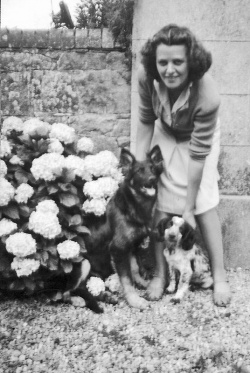No defence
Going back many years, but I can remember living in Jersey when the Germans invaded France. With the Channel Islands being so close to France, my father, Philip E Le Cuirot, realised that the German forces would come to us, which they did. We had no weapons with which to defend ourselves, but they still bombed us, and opened fire on people walking on the beaches.
The first bomb landed outside the Royal Yacht Hotel, where it destroyed the car of Frank Foster, who was to become my father-in-law after the war. Luckily for him, a friend had persuaded him to stay and have ‘one for the road’ – which saved his life.
Boulivot Farm
Going back to our life, we were living on Boulivot Farm, and my father told us to save our most valuable possessions. My father had recently bought a new lorry, and we also had a Humber Snipe car, which we used mainly to go on holiday in France. Knowing someone who worked at the Traffic Department, he managed to have the new lorry’s registration removed from their records, and replaced with an old lorry that was unregistered. My brothers and I had to hide these two vehicles, which were parked outside in our large vegetable garden. The wheels were removed, all the chrome parts were greased, and the vehicles were covered in sheets. We then had to cover everything with piles and piles of straw, until they were completely hidden. When the Germans came to confiscate our vehicles, they only took the old lorry and an old Standard car that we also had.
We regularly added fresh straw to the pile, and despite the German soldiers prodding into the straw with their bayonets, fortunately they never discovered what was hidden inside during all five years that we were occupied. After the war we retrieved the vehicles, and were thrilled that both of them were in perfect condition, and were used for many more years.
Radios
We also owned two radios, so my father hid one of these upstairs in the chimney. He was able to listen to the news daily and keep us informed on how the war was progressing, until our electricity gave out.
Among our family treasures were various items of silverware that had been passed down to my mother, and sets of silver spoons which my grandparents and godparents had given to me when I was born. We wrapped these in newspaper, and packed them in a large tin trunk. My brothers and I had to dig a huge hole in the garden where we buried the trunk containing all our valuables, where it remained for the duration of the Occupation. After our liberation, we dug up the trunk. Although all the silverware was very tarnished, everything was cleaned and restored to its original condition. I recently gave one set of these teaspoons to my granddaughter, and gave her the full history of this priceless treasure.
Russian prisoner
I must also tell the story of Michael, a Russian prisoner, who was one of the prisoners who were brought to the island to build the underground hospital. Michael managed to escape, and was in a pathetic state when he came to our farm. He just put his hands out begging for a bit of food. He wanted to stay in the hay loft, but my father let him stay in the servant’s room instead. Whenever the neighbours warned us that the Germans were around, or we were likely to be searched, he would have to go and hide somewhere else.
Nonetheless, he stayed with us on and off throughout the Occupation. After the war, Michael wrote to us, saying that it was only thanks to the help he had from our family and friends of ours who had also helped him to hide, that he had survived the war. When my husband and I attended the 50th anniversary celebrations in Jersey, Michael was also there. We enjoyed a very special occasion having a meal with Michael and my two brothers, Philip and Maurice Le Cuirot.
I was extremely fond of my horse, Sam, and it broke my heart when one day the Germans came to the farm and took Sam away, saying they wanted to make sausages from him. As they led Sam away, he turned his head back to look at me as if to say “Goodbye”, which for me was absolutely heartbreaking.
Searches
It was always very disturbing when the Germans came to search our house, going from room to room. As a 16 year-old I told them that I did not allow men in my room, which prompted them so strip everything in my room. I then had to appear in front of the Gestapo who told me that they dictate to us, not the other way around.
My brothers and I were aware that there had been plenty of activity near the underground hospital. When the Germans left the island, we went exploring the area with a group of friends, and managed to find some steps that led us down into the kitchen of the hospital. When we found it, it was equipped with beds and an operating theatre, and ready to receive casualties. When we told my parents what we had discovered, my father was extremely cross, given what would have happened to us if the Germans had set any booby-traps before they departed.

